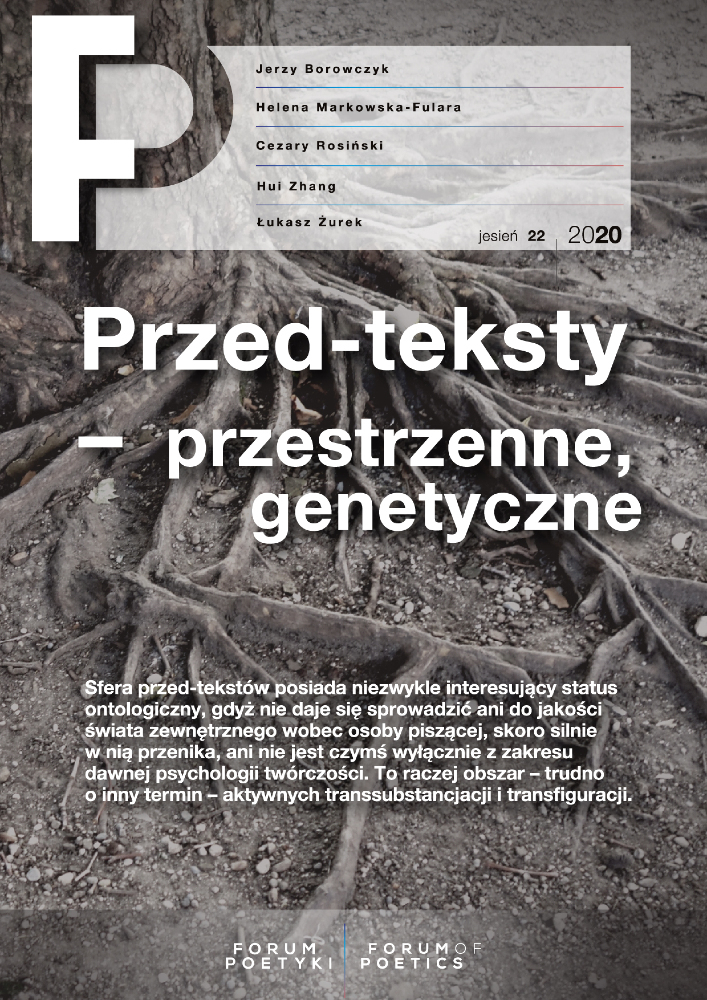Abstract
This paper discusses the imagination and description of China in the works of Boris Pilnyak. It proposes that Pilnyak’s fictions and travelogues demonstrate two approaches to the literary representation of China: the imaginary and the documentary. What unifies these two approaches is the underlying Eurasianist vision of the author, which may be seen as a heritage of the universalist stance of Russian modernist tradition, on the one hand, and as a response to the national identity crisis that arose from the contemporary geopolitical circumstances on the other. The imagery of China served largely as a product of poetic imagination in Pilnyak’s works written before 1922, where it continued the palimpsestic inscription of the myth of China in the Russian literary milieu, perpetuating the conceptual internalization of “China” in the self–fashioning of Russia. An example of this is the image of “Kitai–gorod” in his novel The Naked Year, which generated different symbolic meanings of China. From 1922 on, the variations of narrative settings in Pilnyak’s prose reflected the impact of contemporary events in China on his ruminations on the historical relationship of Russia and Asia. Of seminal significance was his excursion to China in 1926, the product of which became The Chinese Diary, in which China figured as a point of reference for Russia in its self–reflection on socio–political and ideological fluctuations. Combining imagination of history and commentary on reality, Pilnyak’s various conceptions of China served to illuminate the shifting identity of Russia from both the mythologized past and the highlighted present.
References
Abdurazakova, Elena. „Tema Vostoka v tvorchestve Borisa Pil’niaka”. Rozprawa doktorska. Far Eastern Federal University, 2005.
Bassin, Mark. Glebov, Sergey. Laruelle, Marlene. „What Was Eurasianism and Who Made It?”. W Between Europe and Asia: The Origins, Theories, and Legacies of Russian Eurasianism, 1–12. Zredagowane przez Mark Bassin, Sergey Glebov i Marlene Laruelle. Pittsburg: University of Pittsburg Press, 2015.
Browning, Gary. Boris Pilniak: Scythian at a Typewriter. Ann Arbor: Ardis Publishers, 1985.
Damerau, Reinhard. Boris Pil’njaks Geschichts- und Menschenbild: Biographische und thematische Untersuchungen. Giessen: Wilhelm Schmitz, 1976.
Doran, Sabine. The Culture of Yellow or the Visual Politics of Late Modernity. New York: Bloomsbury, 2013.
Kriuchkov, Vladimir. „O «prazdnoi mozgovoi igre» v «Sankt-Piter-Burkhe” B. A. Pil’niaka”. Voprosy literatury 2 (2005): 66–110.
Liubomova, M. I. „O Peterburgskikh povestiakh Borisa Pilnyaka”. W Boris Pilnyak, Opyt sevodniashnevo prochteniia, 55–62. Moscow: Nasledie, 1995.
Maguire, Robert. Red Virgin Soil: Soviet Literature in the 1920’s. Evanston: Northwestern University Press, 2000.
Moraniak-Bamburian, Nirman. „B.A. Pilnyak i «Peterburgskii tekst»”. W B.A. Pilnyak. Issledovanija i materialy, mezhvuzovskii sbornik nauzhnykh trudov 1. Zredagowane przez Aleksandr Auer, 36–46. Kolomna: Izd-vo. KGPI, 2001.
Pilniak, Boris. Chinese Stories and Other Tales. Przetłumaczone przez Vera Reck and Michael Green. Norman: University of Oklahoma Press, 1988.
Pilniak, Boris. Mashiny i volki. Munich: W. Fink, 1925.
Pilniak, Boris. Maszyny i wilki. Przełożyła i posłowiem opatrzyła Janina Dziarnowska. Warszawa: Czytelnik 1984.
Pilniak, Boris. Sankt-Piter-Burkh. Letchworth: Prideaux Press, 1979.
Pilniak, Boris. Sobranie Sochinenii. Moscow: Gos. izd-vo., 1929.
Pilniak, Boris. Stat’i 1922–1929. Moscow: Sovetskii pisatel’, 1991.
Pilnyak, Boris. Nagi rok. Przetłumaczone przez Janina Dziarnowska. Wstępem opatrzyła Ewa Korpała-Kirszak. Warszawa: Państwowy Instytut Wydawniczy, 1987.
Pilnyak, Boris. The Tale of the Unextinguished Moon and Other Stories. Przetłumaczone przez Beatrice Scott. New York: Washington Square Press, 1967.
Prokhorov, Aleksandr, red. Bol’shaia sovetskaia entsiklopediia. Moscow: Sov. entsiklopediia, 1973.
Solzhenitsyn, Aleksandr. „«Golyi god» Borisa Pilnyaka”. Novyi mir 1 (1997): 195
License
Authors of articles are responsible for securing the rights to other publications (texts, tables, drawings and other illustrations) quoted or reproduced in their texts.

